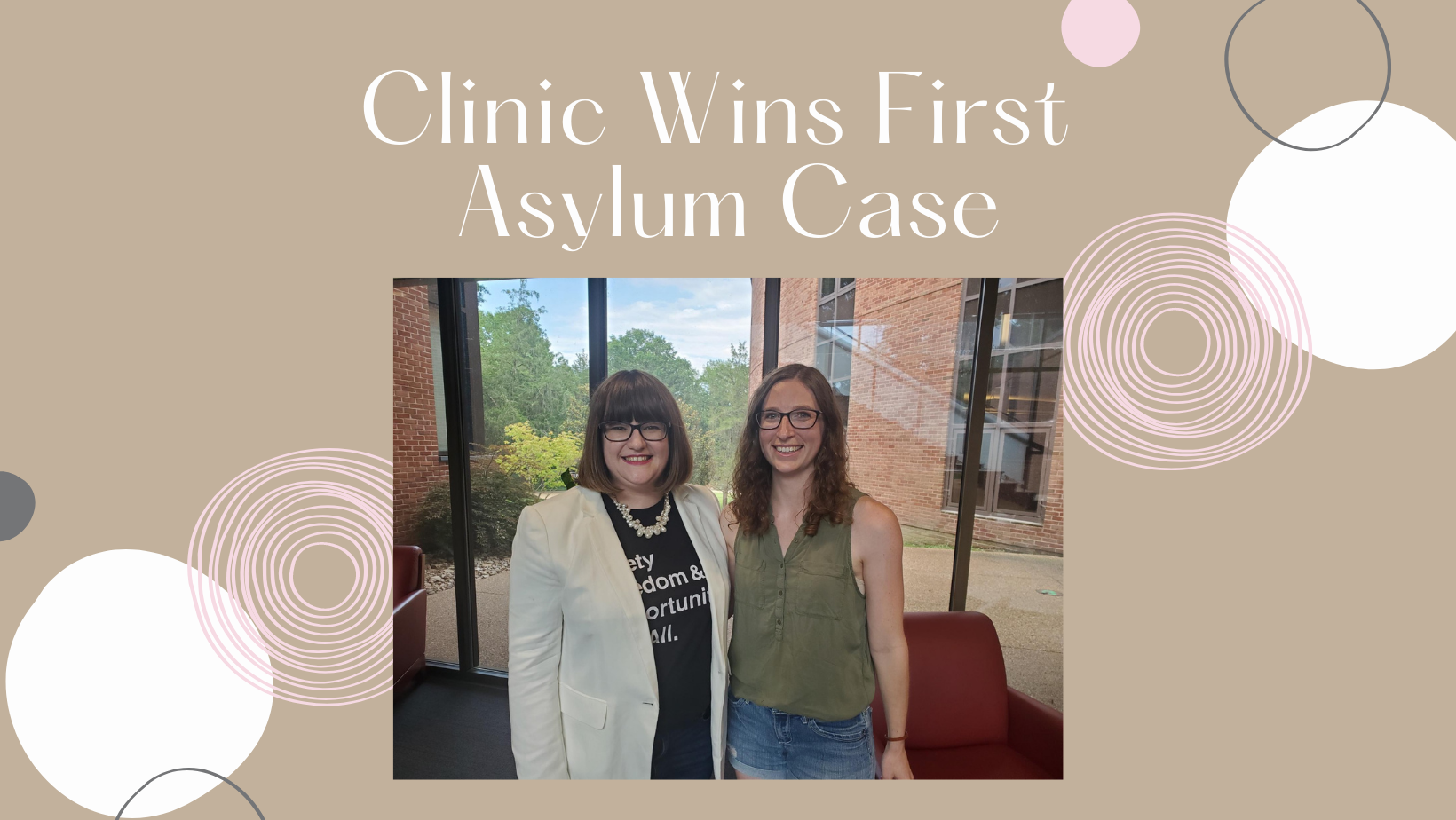On July 13th, the Immigration Clinic received outstanding news: the Clinic has won its first asylum case. The client, Ms. O*, came to the United States as an unaccompanied minor from Central America fleeing gender-based violence and gang violence. She was referred to the Clinic by one of the Clinic’s community partners in the fall of 2020. In May, Ms. O had a four-hours-long, emotional interview at the Arlington Asylum Office. Based on her testimony at the interview and supporting documents, she was granted asylum. A grant of asylum means that she will be able to stay in the United States, work to support herself and her family, petition for her young daughter (who is still in Central America) to join her in the United States, and apply for her green card next year. Looking to her future in the United States, Ms. O wants to one day go to college and even law school.
“For me, winning asylum is a huge opportunity in my life and in the life of my family,” said Ms. O. “I know that since receiving the news that my asylum was granted my life has changed.”
Jess Kraus, J.D. ’21, was assigned to work with Ms. O during the Spring semester. Jess was tasked with building Ms. O’s case from the very beginning: developing the facts of Ms. O’s case to write an affidavit, preparing a motion for immigration court regarding the court’s jurisdiction, gathering evidence from Central America, and researching country conditions to support Ms. O’s testimony. Jess met weekly with her Clinic supervising attorney, Immigrant Justice Corps Fellow and W&M Law Alumna Nicole Alanko, to discuss each step of her progress.
Jess jumped into action without hesitation. Her first assignment was to build the factual record upon which the rest of the case would be based. She drafted her interview plan to elicit the most important information from Ms. O in a way that would not retraumatize Ms. O. Jess had to navigate discussing sensitive topics such as gender-based violence, sexual violence, and domestic violence–all across a language barrier. To fill the language gap, former Clinic student Mel Dostis ‘21, stepped up and volunteered to provide interpreter services to the Clinic. With Mel as interpreter, Jess interviewed Ms. O about the violence she had suffered in Central America, and what she feared would happen if she were forced to return. After the interview, Jess drafted an affidavit to tell Ms. O’s story of what she had suffered.
Jess also had to research cutting-edge, complex immigration procedure for Ms. O. When Ms. O entered the United States, she was issued a Notice to Appear, which placed her in removal proceedings before the Immigration Court. Because Ms. O had entered the United States as an unaccompanied minor, there was a question of who had jurisdiction over Ms. O’s asylum case: the Immigration Court, which is part of the Department of Justice or USCIS, which is part of the Department of Homeland Security. Jess argued in a motion that Ms. O still maintained protections under the Trafficking Victims Protection Reauthorization Act, which entitled her to a non-adversarial interview with USCIS instead of a trial in Immigration Court. Jess’s research and work on this motion led to her blog post, published this past April.
“It is a true privilege to put learning into practice in a way that makes a real difference in someone else’s life,” said Jess. “I couldn’t be more grateful for the opportunity and for the support and guidance from my supervisors and other students in the Clinic. Ms. O is an amazing individual and I am so happy for her and what this means for her future.”
Preparing Ms. O’s case was a team effort. Students enrolled in Immigration Clinic II conducted research using Swem Library’s Asylum Country Conditions Research Guide that became critical to proving Ms. O’s case. Nearly one-third of the three-thousand pages of research compiled by the Immigration Clinic II students for their case was used to support Ms. O’s case. Additionally, through their partnership with the Immigration Clinic, the Flanagan Counselor Education Clinic also provided a letter of support for Ms. O. Additional supporting documents came from the community partner who referred Ms. O to the Clinic.
“I could not be more overjoyed for Ms. O and proud of Jess’s work,” said Nicole Alanko. “Ms. O is an incredible young woman, and I’m so proud that she can look forward to a safer and brighter future here in the United States. Jess did an incredible job on her case, and truly became an expert in Ms. O’s case. Every week in supervision, Jess brought passion, skill, and energy that was absolutely infectious.”
“This victory for Ms. O demonstrates the real and immediate impact of the Clinic’s work and our mission: to mentor and train law students to move from theory to action, to provide access to representation for vulnerable and underserved members of our community, and to honor and amplify the extraordinary strength and courage of our clients through vigorous advocacy,” said Professor Stacy Kern-Scheerer, Director of the Immigration Clinic. “Although some days the obstacles can feel insurmountable and the stakes so high, outcomes like this one powerfully confirm that the Clinic’s advocacy changes lives. As a dedicated team of students, supervisors, and partners, we are providing the skilled legal representation necessary for our clients to obtain the safety and security that they seek in the United States.”
“Thank you to the Law School, especially Jess and Nicole, for the help that they have given me. It is a great help in my life,” Ms. O added. “I want to thank all of the people that help [William & Mary Law School Immigration Clinic] to continue to grow. Without their help, all of the help that the Clinic gives would not be possible.”


